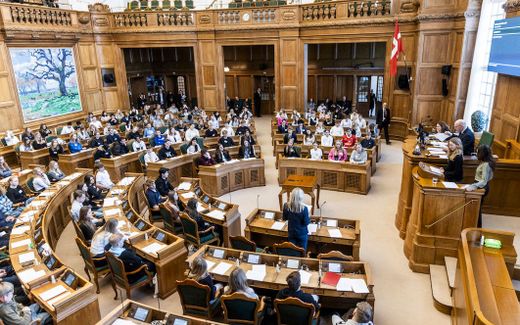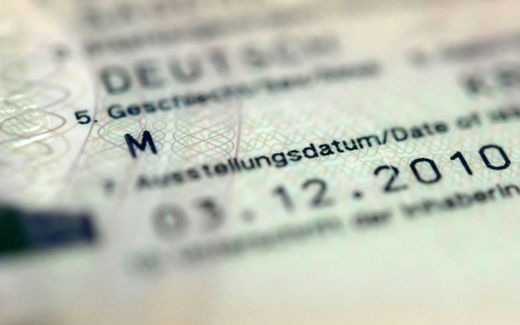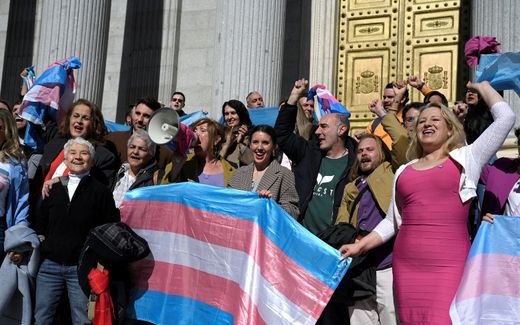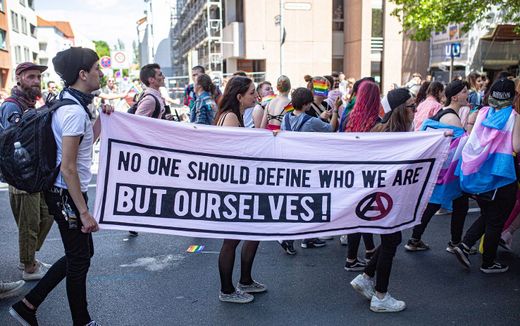Overview: Where do European countries stand with gender transition?
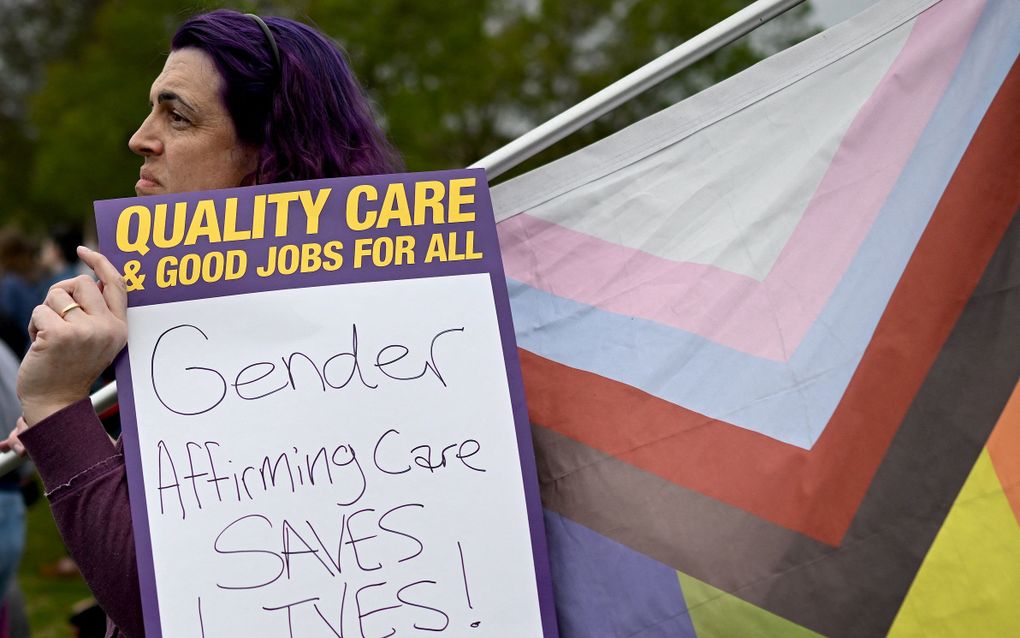
Supporters of LGBTQA+ rights participate in the March for Queer & Trans Autonomy. Photo AFP, Andrew Caballero-Reynolds
European Union
If it comes to gender affirmation, it seems that European countries are in the same process. Most governments have introduced self-determination laws or considering doing that. What happens where? At least one country seems to hit the brakes. And in another country, a transgender man remains legally ‘mother’.
Denmark
Denmark has had a self-determination law since 2014, Transgender Europe wrote in a report last year. Adults only need to file a written application for a new social security number. Stating that the current records do not match the experienced gender is sufficient to receive a new number, which gives access to an updated health card, passport, driver's licence and birth certificate.
Currently, there is a debate in the country about the age limit for gender change. Last August, the Danish government presented a proposal to remove all limits for legal gender change, making the procedure possible even for newborns, Kristeligt Dagblad reported at the time. Last March, the Danish Parliament discussed the age limit for legal gender change. No decisions were made at that time.
Luxembourg
In Luxembourg, adults can change their gender by presenting a request to the Minister of Justice. There are no medical requirements or a consideration period for the procedure. The Civil Code also specifies that children as young as 5 can undergo legal gender change if their parents request it for them. Under the age of 5, special requirements apply, Transgender Europe states in its report.
Malta
In Malta, legal gender change has been easy since 2015, the report from Transgender Europe shows. A special act introduced "the right to gender identity for all citizens of Malta", the government website reads. People of 16 years and older must sign a declaration at the notary, which is submitted to the Public Registry. Minors under 16 have to submit their request through their parents to a court which decides about the case. No surgical gender reassignment is necessary, nor is any expert statement on psychological conditions.
The right to Gender Identity is also included in the Maltese constitution, Malta Today reported in 2014.
Norway
Norway introduced a self-determination law in 2016. Children as young as 6 can change their legal gender with parental consent. This permission is no longer necessary for those 16 years and older, the act on legal gender change states. The process is purely based on self-determination and consists of an application to the tax office.
The self-determination law also states that the legal gender "shall be used as a basis for the application of other laws and regulations." However, gender at birth remains important if it is necessary to establish parentage and parental responsibility, the law reads. "A person who changes their legal gender retains rights and obligations as a result of fatherhood, motherhood or co-motherhood.
In February, the Norwegian Minister for Culture and Equality presented five ways a third gender could be introduced. In January, the Parliament rejected an earlier proposal on this issue.
Finland
Finland simplified the procedure for legal gender change in February. People over 18 no longer need medical and psychiatric approval before changing their gender. Instead, it is sufficient to present the wish to the registry office, which will change the gender in the registrations.
Christian Democratic MP Päivi Räsänen is especially critical of the new legislation. She calls the law "absurd" and argues that the legal gender is disconnected from medical research and biology. "You can change your gender through an application procedure without changing your gender expression", she said earlier.
Spain
In Spain, the implementation of the transgender law has gone rapidly. The country already knew a procedure for adults who wanted to change their gender. They needed a medical report that proved their gender dysphoria. Minors required permission from a court before they could change their legal gender.
The new Spanish self-determination law allows minors between 14 and 15 to change their gender with parental consent only. In case a child is only 12 or 13, a judicial procedure is necessary. The medical report requirement is abolished altogether.
Belgium
Belgium amended its self-determination law late March. That was reported by HLN. Belgians who regret their first legal gender change are now allowed to change it more than once. They can do so via a simple procedure at the registry office.
The Belgian transgender law, which came into force in 2018, specified that people who wanted to change their name and gender for the second time needed to go through a special court procedure. And after that, their gender and name would be definitive and unchangeable.
In the future, the Belgian legislators also want to amend the law to include a gender identifier for people who are non-binary and do not see themselves as male or female. In 2019, the Constitutional Court already ruled that it was unconstitutional to only have the options of male and female to choose from, VRT wrote earlier.
Iceland
In 2019, Iceland introduced an Act on Gender Autonomy that makes it illegal to set any requirements for legal gender change. Since that year, children under 15 may change their legal gender with their parents' consent. If parents do not consent, an expert committee may decide that the minor may go through with the legal gender reassignment anyways, Transgender Europe reports. The request for legal gender change goes via the Registers Iceland. The change in legal gender also gives a person the right to a name change.
Ireland
Adults can apply for a legal gender change quite easily in Ireland since 2015. That year, the Gender Recognition Act was introduced. People over 18 can submit a request for gender change to the Minister of Social Protection, Citizens Information reads. If approved, they will receive a gender recognition certificate, which gives them access to a revised birth certificate. Minors of 16 and 17 years old must request the legal gender change via their adults to the Circuit Family Court. If the Court grants the request, the parents can then apply for a gender recognition certificate for their child. Under 16, legal gender change is not permitted. According to Transgender Europe, legal gender change is free in Ireland.
At the end of last year, the Gender Recognition Act in Ireland was being reviewed. Especially the complex procedures for minors and the lack of a non-binary category were called into question, Transgender Europe reported in November.
Portugal
Portuguese who want to change their legal gender can do so at the civil registry office. A law introduced in 2018 specifies that people do not have to provide proof of medical procedures or psychological treatments. People between 16 and 18 need to acquire parental consent and a doctor's statement to prove their free choice and decision-making capacity, Transgender Europe writes.
Switzerland
Since 2022, Swiss people can legally change their gender by visiting the civil registry office. They do not need to present any medical certificates or change their physical appearance. In addition, legal gender change can be done several times. The Neue Zürcher Zeitung reported that the legal gender change will not impact family law relationships. Marriages will not be broken, and a woman who has given birth to a child will remain its mother, even if she changes her gender.
Germany
Since last week, in Germany, there is a draft for self-determination on the table. Recently, the Ministers of Justice and of Equality agreed on it. The initiative changes the legal gender reassignment procedure into a simple request at the registry office. Children up to 14 must submit their request through their parents, and minors up to 18 have to get parental consent.
Currently, the procedure is much more difficult. Germans need a court procedure or must show a medical report.
However, the proposal contains some ifs and buts. For example, in the case of war, males cannot change their gender to female to evade military service. In addition, males who identify as females will not gain easy access to saunas or be automatically sent to female prisons in the case of a crime. Both may refuse access based on the security of other visitors or inmates.
The bill specifies that people have to wait at least one year between gender changes. And the legal gender change is not implemented until three months after the request is submitted.
The proposal is now up for internal government vote. The queer commissioner of the federal government hoped it could be introduced before the summer recess.
The Netherlands
In The Netherlands, the progress around the introduction of a self-determination law is on hold now. Since 2014, Dutch citizens can change their legal gender without undergoing surgery. The current procedure is that they must present their request with an expert's statement to the registry office at their place of birth.
Now, some progressive political parties want to change the transgender law and remove the requirement of an expert's opinion and the age limit. The liberal D66 party even wants the procedure for children under 16 to be the same as the adult one.
To that end, the previous Cabinet submitted a proposal to the Parliament in 2021. This took place relatively quiet until the issue was debated last September. The larger parties in Lower House seemed to be reluctant on the issue. As a result, the next debate and the voting rounds have been postponed at least until the early summer.
Sweden
Sweden seems to be hitting the brakes when it comes to self-determination legislation. Recently, the issue came up for debate again, Dagen reported.
Up till 2021, Swedish transgender legislation showed a progressive tendency. That year, the government decided to lower the age for legal gender change to 12.
However, since then, the Swedish government has proceeded with caution regarding transgender legislation. Last January, Swedish health authorities pointed out that there is insufficient research in the field to guarantee the safety of transgender treatments. That was reported earlier by CNE.news.
Last July, the legal council of the Swedish government called for a new law that included better protections for transgender people Dagen wrote earlier. In March, Health Minister Acko Ankarberg Johansson said that a new bill on legal gender change is being prepared by the Riksdag.
Scotland
Scotland failed in liberalising its transgender law. The British government blocked its proposal to lower the age for legal gender change from 18 to 16. In addition, it did not allow the Scottish to remove the requirement of a medical diagnosis and the precondition that an individual must have lived under the new gender for at least two years. That was reported earlier by CNE.news.
The current transgender law specifies that Scots who are dissatisfied with their legal gender must apply to a UK gender recognition panel and present a diagnosis of gender dysphoria. In addition, they must show proof of physical gender reassigning treatments, BBC wrote earlier.
Slovakia
In Slovakia, the debate on the Gender Recognition Act is in full swing. Currently, the country allows legal gender change under strict conditions, Amnesty International reports. A person must have undergone physical gender reassignment treatments to change the legal gender, the government website reads. These treatments included mandatory sterilisation.
However, the Slovak parliament has tabled a bill to change the legislation and forbid gender recognition. The bill proposes that transgender people have to present proof of their chromosomes to have their legal gender affirmed. If it turns out that someone has female chromosomes, she will not be able to register herself as a male. The MPs are to vote on the issue this May.
Russia
Russians can change their legal gender by presenting a medical certificate to prove their transgenderism, CNE.news reported earlier. Such a certificate did not require surgical gender reassignment.
However, Justice Minister Konstantin Chuichenko wants to change this practice. In an interview with TASS, he stated that the practice is against traditional Russian values. Therefore, he works on an amendment to force transgender people to change their physical sex before their legal sex.
Related Articles


